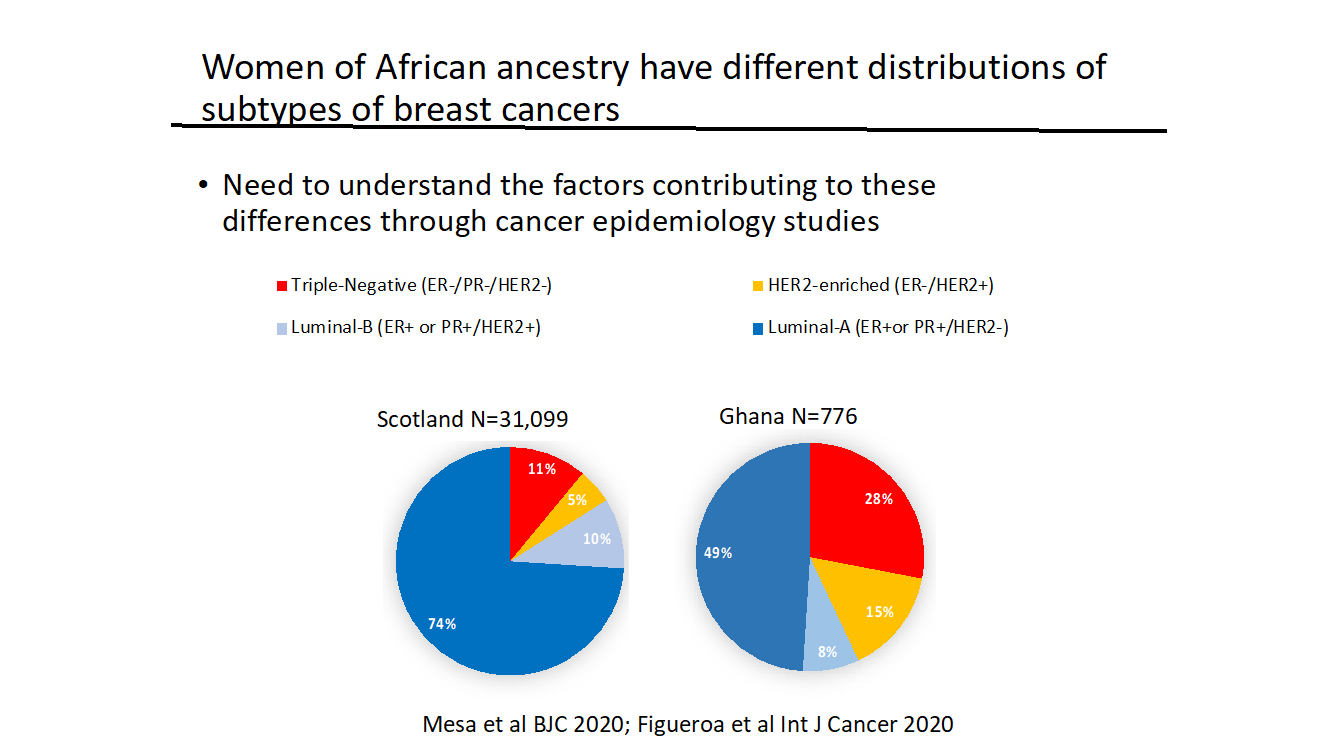Population Study of Breast Cancer in Ghana Identifies Associated Risk Factors

It is clearer now more than ever of the importance of epidemiology, the study of the distribution and determinants of health and disease. Epidemiology is vital in shaping public health prevention and cancer control programmes by providing evidence of associated risk factors for the disease that, if modifiable, can be promoted and if not might identify people at higher risk for the disease so that they can be monitored to catch and ideally prevent or allowing treatment at an early stage when it is more likely to be successful. Epidemiology studies have helped to identify breast cancer risk factors such as specific genetic variants and other lifestyle/environmental risk factors, to promote risk reducing strategies (for example increased physical activity or avoidance of radiation exposure to high risk mutation carriers). Furthermore, epidemiology studies have also provided the objective evidence to determine factors associated with survival which are used routinely in the NHS (see https://breast.predict.nhs.uk/). However, these studies have largely analysed European populations whilst people of African ancestry have received significantly less attention. There are differences in the demographics of African populations compared to European populations and studies in diverse populations can provide new insights on associated risk factors of cancers. On top of this, there is a higher incidence of early onset aggressive subtypes of breast cancers in African populations. With incidence rates for breast cancer increasing there is an urgent need to delineate factors that could be targeted for prevention as well as improved strategies for treatment. Dr Jonine Figueroa designed, with partners in Ghana and funded by the National Cancer Institute in the US, a population-based case-control study of breast cancer. This study aimed to identify associations between specific risk factors and the incidence of breast cancer subtypes. Dr Figueroa discussed with me the study’s findings and the importance of this study and others like it on improving public health prevention and strategies to improve survival in sub-Saharan Africa.
Investigation of the heterogeneity of cancers can be important in the recognition of specific risk factors and for designing an effective treatment. Breast cancers can be distinguished by sensitivity to particular hormones. Breast cancers with receptors for Oestrogen are known as Oestrogen receptor (ER) positive and those lacking the receptors are ER negative. Cancer subtypes have different prevalence in different populations and can be associated with different risk factors. There is a high incidence of aggressive ER negative breast tumours in African women and in women of African ancestry, whilst the frequency of ER positive breast cancer was lower than that in European populations. One factor that likely contributes to lower incidence of ER positive cancers was found to be related to a high number of births and extended breastfeeding.
A key finding of the study was the discovery of a strong inverse relationship between the number of months of breastfeeding and the risk of developing breast cancer. While increased number of births was associated with ER-negative breast cancers among women <50 years of age for aggressive triple-negative tumour subtype, breastfeeding reduced the risk. Women breastfeeding for 13-18 months were found to have a 15% reduced risk of developing breast cancer compared to women breastfeeding for less than 13 months. Promoting extended breastfeeding can be an important public health promotion campaign that could have a large effect in the reduction of breast cancer in numerous populations in Africa but also in Europe where rates are still significantly lower than in Low and middle income countries.
Dr Figueroa explained that the success of the study came down to communication and collaboration. All communities want improved health, however, a history of exploitation and poor representation in science can make African populations sceptical of participating in research studies. Successful community involvement in the aims and importance of the study to communities, tribes and leaders lead to exceptionally high participation, particularly in control groups, which resulted in the generation of very high quality data. On top of this, work with highly skilled clinicians allowed successful improved diagnostic capabilities that were good for the patients as well as the research sample collection at participating hospitals.
The next steps in this investigation involve following up with the individuals to look at survival, thereby giving more information on factors and markers that might predict worse survival from the cancers. Moreover, investigations in other countries, such as the study being conducted in Kenya, are important to further research in other indigenous African populations. Continuation of studies such as this are vital in the improvement of public health policies and the development of global health strategies for reduction of cancer incidence.
Figueroa JD, Davis Lynn BC, Edusei L, Titiloye N, Adjei E, Clegg-Lamptey JN, Yarney J, Wiafe-Addai B, Awuah B, Duggan MA, et al (2020) Reproductive factors and risk of breast cancer by tumor subtypes among Ghanaian women: A population-based case–control study. Int J Cancer 147: 1535–1547
Mesa-Eguiagaray I, Wild SH, Rosenberg PS, Bird SM, Brewster DH, Hall PS, Cameron DA, Morrison D, Figueroa JD. Distinct temporal trends in breast cancer incidence from 1997 to 2016 by molecular subtypes: a population-based study of Scottish cancer registry data. Br J Cancer. 2020 Sep;123(5):852-859.




Identifying region-specific risk factors is vital for improving breast cancer prevention strategies globally. Alongside genetics and environment, diet remains a key modifiable factor. Understanding the glycaemic index can support informed nutritional choices: https://www.shemed.co.uk/blog/understanding-the-glycaemic-index-gi-for-better-food-choices